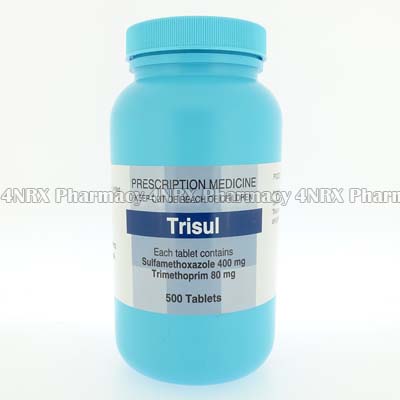 |
Home  Infection Infection  Trisul (Trimethoprim/Sulfamethoxazole) Trisul (Trimethoprim/Sulfamethoxazole) |
|
|||||||||
|
|
Trisul (Trimethoprim/Sulfamethoxazole)
What is Trisul (Trimethoprim/Sulfamethoxazole) used for? Trisul (Trimethoprim/Sulfamethoxazole) is a combination of two antibiotic medications used to treat a large variety of bacterial infections. It operates by destroying or stopping the reproduction of bacteria cells making it easier for the immune system to eliminate the infection. The medication is commonly used for treating bacterial infections of the lungs, airways, urinary tract, bones, soft tissues, skin, or middle ear. Your doctor may prescribe this medication to be used along with others or for the treatment of other unlisted conditions, as well. How should I use Trisul (Trimethoprim/Sulfamethoxazole)? Trisul (Trimethoprim/Sulfamethoxazole) should be used according to your doctor`s instructions to get the best results from treatment. One tablet is normally prescribed to be taken once or twice daily for a period of medication lasting one or two weeks, but your individual directions will depend on your age, weight, health condition, the condition being treated, and the severity of your symptoms. These should be swallowed with a large glass of water on an empty stomach to aid absorption. Wait two hours after a meal or take the tablet one hour before a meal to ensure the contents of the stomach are emptied. Never change the form of the tablets by crushing, splitting, or chewing them as this may destroy or alter the effects of their contents. Do not stop using the medicine before being told to by your doctor, even if your symptoms have disappeared, as the infection may not be gone and can return stronger or more resistant to treatment. Ask your doctor any questions you have about the medicine to ensure the correct administration. What are the side effects of Trisul (Trimethoprim/Sulfamethoxazole)? Trisul (Trimethoprim/Sulfamethoxazole) may lead to side effects in some patients such as:
Serious side effects that may require immediate medical attention are fever, flu symptoms, pale skin, easier bruising, high potassium levels, severe headaches, or muscle fatigue. Tell your doctor as soon as any unusual symptoms appear to ensure the necessary adjustments are made to your dosage or frequency of administration to prevent more complications from occurring. Please Note Trisul (Trimethoprim/Sulfamethoxazole) should not be administered to patients who are pregnant, breastfeeding, allergic to trimethoprim or sulfamethoxazole, who have had a bad reaction to similar treatments in the past, or who have irregular blood cell counts. Also inform your doctor if you have porphyrias, a folic acid deficiency, reduced liver symptoms, or decreased kidney function as these conditions may cause unexpected health problems requiring adjustments to your regimen. Strictly use Trisul (Trimethoprim/Sulfamethoxazole) as prescribed and follow all instructions provided by your doctor. Safe, suitable, and optimum dosage can vary and is dependent on the patient`s health and medical history, as well as the condition you are treating. Trisul (Trimethoprim/Sulfamethoxazole) may not be safe or suitable for all patients. Always ensure your doctor is informed if you are pregnant or breastfeeding, using any other type of medication (including non-prescription medicine, vitamins, and supplements), as well as if you have any allergies, other illnesses, or pre-existing medication conditions. Seek immediate medical attention or proceed to your nearest accident and emergency department if you suffer a hypersensitive or allergic reaction. Symptoms usually present during a reaction of this nature include difficulty breathing or swallowing, swelling of the limbs or face, tight chest, hives, and skin rashes. 
|
||||||||||||||||||